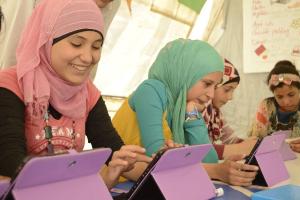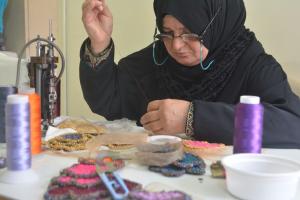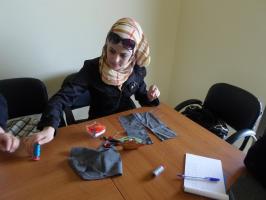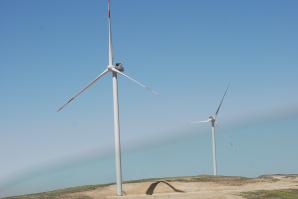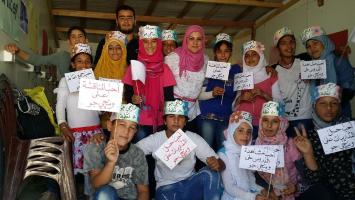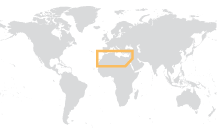Hope for Syria
Investments in programmes designed to keep Syrian refugees close to their homeland—and help them get prepared to rebuild the country when the war ends
When the school year started in September, only 200,000 of the Syrian refugee children in Lebanon were able to attend local schools. Lebanon simply didn’t have capacity for the other 600,000. Ahmed Saeed, an Egyptian who’s a director at ITWorx, an online education company, arrived in one refugee camp in the Bekaa Valley village of Saadnayel and set about building a school in a tent. Within three weeks he had 50 students of all ages, many of whom hadn’t been able to attend school for four years, studying a Cloud-based version of the Lebanese curriculum on $60-tablets with the aid of only a couple of teachers. “They feel they are important,” says Saeed. “Someone is finally taking care of them.”
The ITWorx school, which the company maintains could be expanded to cover all the Syrian refugees in the region, is aimed at rebuilding the future of those who fled the civil war in their homeland. It’s also founded on the idea that helping refugees to stay in the region will make it more likely that they’ll return to participate in the reconstruction of Syria when the war is over. “You can fight the refugee problem politically,” says Romen Mathieu, ITWorx chairman. “But the best way to fight is with culture and investments—by creating hope in the region.”
Projects all around Syria’s borders
The European Investment Bank’s involvement in the Middle East aims to build the kind of stability that in turn creates an incentive for refugees to remain in their region. The Bank’s role is also expanding:
- The EIB was one of the first investors in the EuroMena Fund with EUR 10 million in 2006, when Romen Mathieu, who also heads the fund, bought the Egyptian software company ITWorx. He later transformed it into an education company that serves 5 million students around the world
- The EIB is now an investor in two other EuroMena funds that focus on the Mediterranean region. Its growing commitment to the region shows in the increased investments of EUR 13 million in 2008 and EUR 20 million in 2013
- The EIB is preparing a EUR 71.5 million microfinance facility for the EU Southern Neighbourhoods region, which would emphasise projects in Jordan and Lebanon. It will be financed with a contribution from the European Commission and EIB’s own resources. The project should be ready to go ahead in April
- The Bank already participates in microfinance programmes in Lebanon run by Al Majmoua, a non-profit that makes 56% of its loans to women and since 2014 has offered loans to Syrian refugees. The EIB has invested in Al Majmoua twice since 2009
- In Turkey, the EIB Group intends to expand a programme of loan guarantees and counter-guarantees to businesses in areas of the country typically overlooked by banks. The programme will be made available to refugees who will be offered favourable conditions. Since 2010 the Greater Anatolia Guarantee Facility has used EUR 61.4 million to support EUR 1 billion of investment, working alongside the Turkish government. The Facility operates in Turkish regions where income is less than 75% of the national average and where companies receive only 10% of total Turkish lending
- The EIB is appraising a loan to a new 1,875-bed hospital in Gaziantep, close to Turkey’s border with Syria. The hospital will serve the local population, but is also expected to provide health services to Syrian refugees whose presence has created pressure on the region’s healthcare system. The project may provide construction jobs for Syrians too. Building could be completed by 2019
- The EIB has funded Jordanian renewable energy projects in recent years and last year agreed a deal to upgrade the national electrical grid that will improve the transmission of energy around the country. In turn, that electricity will contribute to the power needed by another EIB deal in Jordan signed last year. The EUR 49.7 million Wadi al-Arab project will pipe water to an area of northern Jordan that’s already dry—and getting drier because of the influx of refugees across the border with Syria. By 2018 the 26 km pipeline will bring 30 million cubic meters of fresh water and contribute to stability in the region by reducing the tensions over water resources
Ready for when they return
The Lebanese microfinance non-profit Al Majmoua asked its Lebanese clients how they felt about participating in lending programmes with Syrian refugees. The initial response was profoundly negative. “They said, ‘How can you think about giving loans to Syrians?’” says Youssef Fawaz, Al Majmoua’s executive director. “But as a microfinance organisation we felt we could not ignore the issue.”
That was in 2013. Since then Al Majmoua has run trainings for more than 8,000 Syrian women and youths and incorporated 200 of them into their group loan programme, gradually introducing them to Lebanese women to work on joint projects in which four or five women take a group loan. “It really built relations between them,” Fawaz says.
Most of Al Majmoua’s clients work in handicrafts, hairdressing and service jobs that allow the women to be their own bosses.
- Youssra Nawasra, who grew up in Deraa wanting to be a fashion designer, fled Syria and sat around her new home in Baysour, a village in the Mount Lebanon region south of Beirut, for 6 months before one of her aunts convinced her to take a training course backed by Al Majmoua. “A new window opened up in my life, and there was light again,” Nawasra says. She took vocational training classes in sewing, as well as business management and financial training sessions. Now working as a seamstress, she’s considering a small loan from Al Majmoua to buy equipment for her own couture workshop
- Rawaa Moghrabi visited Al Majmoua to ask for training as a hairdresser. She mentioned that she had owned a restaurant in Syria. Al Majmoua gave her training in marketing and a loan to buy a fridge for a new business selling prepared food
Al Majmoua’s Fawaz is proud the organisation helped these Syrian women find an income and even integrate somewhat. But he believes Al Majmoua’s training will be even more use to them when Syria finally emerges from its civil war. “When our clients go back to Syria, they can use the credit history they have from us as a guarantee of good performance,” he says. “That will help them—and Syria—get back to normal.”
A renewable cycle
Spinning in the winds that sweep across the desert flats, the 55-metre-blades of Jordan Wind Project’s 94-metre-high turbine towers flash against the sun. The Tafila Wind Farm started commercial operations in September, backed by a EUR 58 million EIB loan. In the shadow of conflicts in neighbouring Syria, Iraq and Egypt, the project defied regional instability just as surely as its towers stand unbent by the desert gusts. Now it’s part of a network of EIB loans that are helping create a sustainable and stable future for Jordan.
Tafila’s towers are the sentinels of a new industry that will transform the country’s economy. Jordan aims for renewable energy to contribute 10%of its needs by 2020. That’s vital to a country whose energy costs eat up 20% of its gross domestic product. Tafila’s 38 turbines produce enough electricity to power more than 83,000 of Jordan’s 1.2 million households. Jordan’s National Electric Power signed a 20-year deal to take all of Tafila’s production.
The EIB is already involved in Jordan’s renewable energy future. In December, the bank signed a EUR 66 million deal with the Jordanian power company to finance the infrastructure that connects future renewable energy projects to the country’s electrical grid.
It’s that power which will be used to pump water through the new pipeline to the north of Jordan near the town of Irbid. The loan will also build a water treatment plant and three pumping stations by 2018.
Tablets across the region
Back at the tent school in the Bekaa Valley, ITWorx Chairman Mathieu is keen to emphasise that his programme doesn’t require the massive investment of infrastructure projects. The company’s e-learning platform Winjigo could be expanded to cover all the Syrian refugee children in Lebanon within three months. He puts the cost at USD 200 per student for the first year. The second year costs only USD 120, because the student continues to use the tablet they received in the first year. Very swiftly, he adds, it could be implemented around the region and beyond. “We’ll leverage what we are doing with Syrian refugees in Lebanon and take it to Jordan, Turkey and even refugees in Europe,” says Mathieu.

